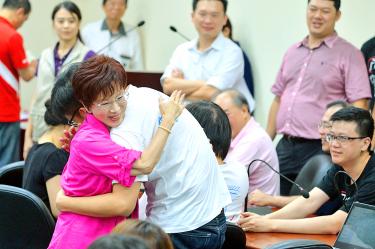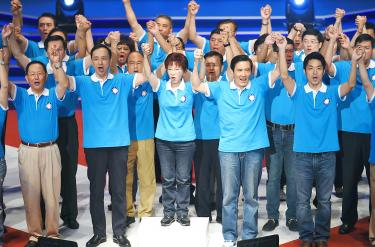- Theoretical Framework: Clemente and Roulet’s (2015) “the spiral of deinstitutionalization”
- Case: Taiwan's majority political party Kuomintang (KMT) changed its presidential candidate Hung Hsiu-Chu three months before the Election Day.
- Data: Field observation mateirals collected between April 20 and Oct. 17, 2015
- Contributions: enrich the theoretical framework with the case study and advance the understaning about the mechanism of deinstitutionalization within a political party in a democracy.
November 21, 2015
Introduction
Background
- the defeat of KMT in the local election in the end of 2014
- KMT failed to nominate a presidential candidate until April 2015
- Hung Hsiu-Chu volenteeared to run the presidential candiate and formally nominated on July 15 (46% support rate in polls) but dropped to lower than 30% within three months.
- KMT extempore congress rescinded Hung's candidacy on Oct. 17 and called chairman Eric Chu as the presidential candiate.
Research Questions:
- Could this seldom seen and dramatic change in the presidential candidate nomination occurred within Taiwan’s largest political party is simply attributed to the calculation of wining the election?
- How could it happen given that Hung had passed all required legal nomination process set by KMT itself?
- Could the polls showing the slim chance that Hung would win decide the decision shift? If so, how could that happen?
Definition of Deinstitutionalization
- Deinstitutionalization is a process by which practices are abandoned because they have lost their social approval (Oliver, 1992).
- A deinstitutionalization process relies on discursive struggles between actors who push to abandon a practice and those who try to maintain it and public opinion empowers actors of one side to oppose the other side (Clemente & Roulet, 2015).
- “In fields that exert a strong silencing pressure on their members, insiders are less likely to align with public opinion’s hostility initially, but once a majority of field members agree with public opinion, field opinion exerts a greater pressure on other members to comply and abandon a practice.” (p.36)
Theoretical Framework:

The Role of News Media
- the news media are “crucial vehicle for assessing the climate of opinion at the public level” (p.15).
- Inside the institution or the “field,” the field media play a crucial role of targeting at field members and “exerting a strong pressure for conformity” (p.18).
The Match between the Case and the Theoretical Framework:
- The Hung camp: majority in the first plac and became the minority in the field
- The anti-Hung camp: Find and use field polls to convert other decision makers in the field
Stage 1:
Hung’s claiming to run for nomination on April 20 to the internal polls, used to confirm her popularity, held on June 12-13.

Stage 2:
from the release of the poll results to the KMT’s national party congress on July 19, where the party formally nominated Hung.

Stage 3:
from the party congress meeting to the extempore congress meeting on October 17, where Hung was rescinded as the party’s president candidate.
The ending scene:
On Oct. 17 chairman Chu completed the legal process of replacing Hung to run the election with the approval of 812 out of 891 national representatives who attended the congress that day. In effect, 993 representatives showed up that day but 102 left the hall earlier. This scene showed to us how the minority expressed their silence.
Revisit the theoretical Framework:

Extra Insights Drawn from Observation
- it is not clear if the whole story of deinstitutionalization is built upon the fear of isolation.
- strategic motives drive the use of both field and public opinion.
- in theory identification with a field could moderate the views of those in the minority to resist conversion.resource arrangement can be a critical cause of division within the field
- resource arrangement can be a critical cause of division within the field
Limits of the study:
- We were not able to reach out for the key actors and check the extent to which our interpretation and description fit their true motives.
- We have not collected evidence, if it is possible to collect, about how key actors create and maneuver field opinion and how these fields opinion are connected or linked to public opinion.
Final Thoughts:
- the (re)definition of Deinstitutionalization
- the moral meaning of deinstitutionalization
- the importance of studying the interactions between key actors and leaders within a party